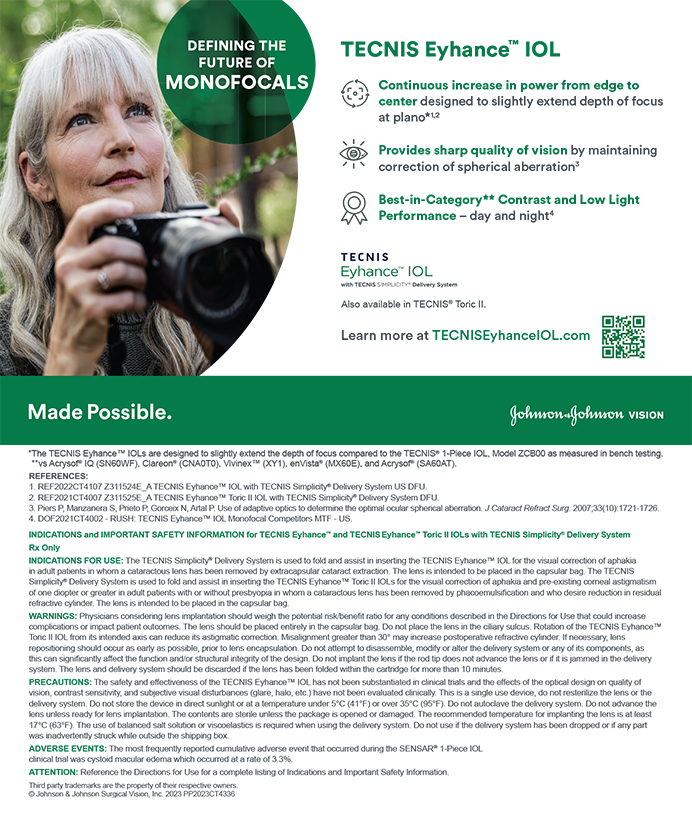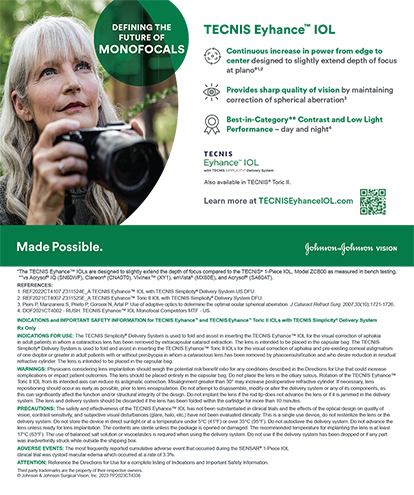Several months ago, I was asked to act as an expert witness for the defense of a colleague in a LASIK case. As best I could discern, the case boiled down to whether or not the presence of a 4-mm, peripheral epithelial defect constituted a complication of LASIK surgery. How does this type of case make it into court?
GROUND RULES
I should first set forth the ground rules under which my ethical and practical compass operates.
Patients
• All patients have a right to sue a physician if they are reasonably certain that negligence occurred during their care. The negligence at issue, however, must have significantly hurt the patient. In other words, no harm, no foul.
• All patients deserve to know who exactly is performing all aspects of their surgery.
• All patients deserve a legitimate informed consent process.
Ophthalmologists
• Colleagues who testify in good faith and for appropriate reasons against another ophthalmologist deserve respect. Colleagues who testify against another ophthalmologist in less than good faith and/or for less than completely valid reasons deserve contempt.
• Negligence does occur, and the country needs a system that deals with it.
• The occurrence of known complications from a procedure does not in itself constitute negligence.
• The informed consent process should include handwritten statements by the patient, not just that person's initials.
• Settling a case in the presence of negligence makes sense.
• Proportional liability is reasonable. A surgeon may expect that trained staff members will perform within the standards of their training. If a scrub nurse mistakenly fills a syringe with a liquid that damages a patient's eye, the surgeon should not be 100% liable, because he or she could not reasonably have known which clear liquid was in the syringe despite his or her requesting the proper fluid.
ANALYSIS
So, where has the system gone afoul? Usually, surgeons like to blame unscrupulous, ambulance-chasing lawyers. Although unethical lawyers are doubtless part of the problem, the majority of medical malpractice lawyers I know would rather not waste their time on an unreasonable case.
It is worth remembering that every plaintiff's case must have an expert witness who states that negligence was present. This stipulation points to a major issue. Earlier, I stated that patients bringing a lawsuit should be “reasonably certain that negligence occurred during their care.” I believe that virtually every unreasonable case of negligence, such as the one presented herein, involves a plaintiff's expert (an ophthalmologist) who is confused about the difference between an undesirable aspect of surgery, a complication, and true negligence. This confusion may be based on a lack of perspective, a desire for financial gain, or other reasons.
In the case I have presented, how does an epithelial defect get classified as a complication? Such defects occur in approximately 10% to 15% of all LASIK cases and can be expected to heal without a problem virtually 100% of the time. I do not believe that anyone can rationally or scientifically argue that an epithelial defect of 3mm is not a complication but a 6-mm defect is (PRK creates a 6-mm epithelial defect in all cases). In supporting a plaintiff's claim of negligence, the plaintiff's expert witness is part of the dynamic process that defines the nature of a surgical complication. Trivializing what a complication is will probably implicate 99% of all surgeries.
Even negligence, however, must result in some damage for the surgeon to be found guilty of practicing below the standard of care. If an ophthalmologist does not check an eye's IOP before creating a satisfactory LASIK flap with a microkeratome and the patient attains 20/20 visual acuity, then there should be no finding of negligence. If this surgeon created an unsatisfactory flap and the procedure produced a poor visual result, however, then not checking the IOP may well constitute negligence.
SOLUTIONI propose that several of our major professional publications print a list of all ophthalmic malpractice cases as soon as the legal process allows. These reports should identify the main claim, the plaintiff's expert, and the defense's expert for each case. These reports would reveal which ophthalmologists are working to create a fair judicial system for patients and surgeons and which are helping to convert the practice of medicine and surgery in the US into a tragic comedy.
A law under consideration in Florida would mandate the immediate loss of a physician's license after three court cases finding that he or she acted below the standard of care (medical negligence). Such a law would force physicians to settle cases rather than defend themselves. More importantly, it would deter great physicians from treating patients with difficult problems. The judicial system would then guarantee mediocrity in medicine, even though the intention is to improve the quality of medical care (similar to an HMO).
I believe that a small number of ophthalmologists' inappropriate behavior and judgment are causing much of this mess. To the best of my knowledge and experience, I am unaware of any profession that has effectively policed its own members (investment banking, medicine, law enforcement, etc.). Maybe ophthalmology in the early 21st century will become the first. If not, technical advances in eye surgery will continue as our profession declines.
Lee T. Nordan, MD, is a technology consultant for Vision Membrane Technologies, Inc., in Carlsbad, California.Dr. Nordan may be reached at (760) 431-1846; laserltn@aol.com.


